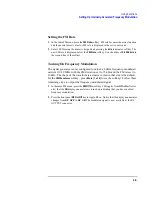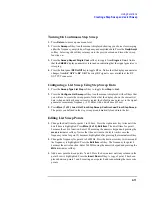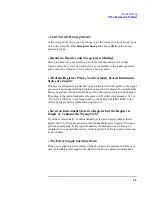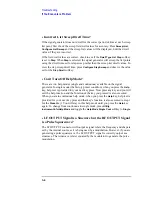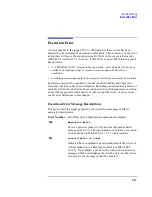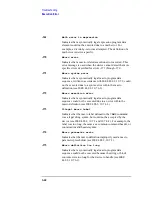
3-7
Troubleshooting
Querying the Error Queue
Querying the Error Queue
The queue query message is a request for the next entry from the instrument’s
error queue. This queue contains an integer that can range from -32768 to 32767.
Negative error numbers are reserved by the SCPI standard and are defined in this
section. Positive error numbers are instrument-dependent. An error value of zero
indicates that no error or event has occurred.
The signal generator responds to the
SYSTem:ERRor?
(or
STATus:QUEue?
)
query using the following form:
<error number>, <error description>
The <error number> is a unique error descriptor. Certain standard error numbers
are described in this section. The <error description> is a short description of the
error, (optionally) followed by additional information regarding the error. Short
descriptions of the standard error numbers are described in this section. The
information that follows the error message may contain corrective actions that
should be followed to correct the error condition.
The <device-dependent info> section of the response may contain information
which will allow you to determine the exact error and context. For example:
-131, Invalid suffix;FREQuency:CENT 2.0E+5 dBmV
The maximum string length of <error description> plus <device-dependent info>
is 255 characters. The <error description> will be sent exactly as indicated in this
document, including case.
If there has been no error, that is, if the queue is empty, the signal generator will
respond with:
0, No error
If there has been more than one error, the instrument will respond with the first
one in its queue. Subsequent responses to
SYSTem:ERRor?
will continue with
the queue until it is empty.
Summary of Contents for ESG Series
Page 3: ...ii ...
Page 29: ...1 12 Preparing for Use Verifying Signal Generator Operation ...
Page 43: ...2 14 Using Functions Saving and Recalling an Instrument State ...
Page 95: ...3 52 Troubleshooting HP Sales and Service Offices ...
Page 109: ...4 14 Front and Rear Panel Rear Panel Overview ...
Page 111: ...5 2 Hardkey and Softkey Reference ...
Page 135: ...5 26 Hardkey and Softkey Reference Ampl ...
Page 137: ...5 28 Hardkey and Softkey Reference Amplitude ...
Page 139: ...5 30 Hardkey and Softkey Reference Arrow Keys ...
Page 141: ...5 32 Hardkey and Softkey Reference Display Contrast Keys ...
Page 161: ...5 52 Hardkey and Softkey Reference FM ...
Page 169: ...5 60 Hardkey and Softkey Reference Frequency ...
Page 171: ...5 62 Hardkey and Softkey Reference Help ...
Page 173: ...5 64 Hardkey and Softkey Reference Hold ...
Page 175: ...5 66 Hardkey and Softkey Reference Incr Set ...
Page 195: ...5 86 Hardkey and Softkey Reference LF Out ...
Page 197: ...5 88 Hardkey and Softkey Reference Local ...
Page 199: ...5 90 Hardkey and Softkey Reference Mod On Off ...
Page 200: ...5 91 Hardkey and Softkey Reference Mode Mode This front panel key is reserved for future use ...
Page 201: ...5 92 Hardkey and Softkey Reference Mode ...
Page 203: ...5 94 Hardkey and Softkey Reference Numeric Keypad ...
Page 225: ...5 116 Hardkey and Softkey Reference Power Switch ...
Page 235: ...5 126 Hardkey and Softkey Reference Preset ...
Page 241: ...5 132 Hardkey and Softkey Reference Pulse ...
Page 245: ...5 136 Hardkey and Softkey Reference Recall ...
Page 247: ...5 138 Hardkey and Softkey Reference Return ...
Page 249: ...5 140 Hardkey and Softkey Reference RF On Off ...
Page 255: ...5 146 Hardkey and Softkey Reference Save ...
Page 275: ...5 166 Hardkey and Softkey Reference Sweep List ...
Page 311: ...6 10 Options and Accessories Upgrade and Retrofit Kits ...
Page 312: ...7 1 7 Operation This chapter is reserved for future use ...
Page 313: ...7 2 Operation ...
Page 322: ...8 9 Safety and Regulatory Declaration of Conformity Declaration of Conformity ...
Page 341: ...9 18 Specifications HP ESG Series Signal Generators Specifications ...



